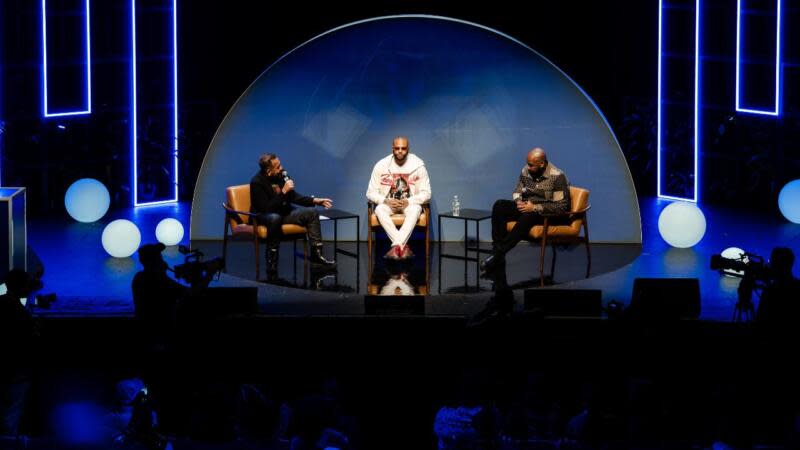Financial And Artistic Freedom In The Music Industry Is More Important Than Ever, SelectCon 005 Panelists Say

Championing complete independence as an artist and how to monetize your artistry took centerstage at UnitedMasters’ annual SelectCon on Saturday.
Cultivated by businessman and record executive Steve Stoute, the platform prides itself on its promise to “redefine the landscape of music, technology and innovation.”
Hosted by TT Torez, Ivy Rivera and V-Live, the event at Manhattan’s Terminal 5 consisted of a mix of interactive panels/workshops, live performances, opportunities for networking and brand showcases.
During the event, Bulleit designated time on the rooftop for its 100 Hours Commitment program, a year-long program to provide emerging pioneers with 100 hours of mentorship from established talent thanks to Bulleit’s long-standing relationship with music and creator platform, UnitedMasters. Participants gained exclusive one-on-one mentorship and opportunities to acquire invaluable insights from industry professionals.
Among the speakers who dropped knowledge were Steve Stoute, Davido, Tokischa, LVRN (Love Renaissance), Rashad Bilal and Troy Millings of Earn Your Leisure, Elliott Wilson, Dometi Pongo and AJ Ramos.
For those unfamiliar, a “master recording” is the original recording of a song. According to Dan Deluca of The Philadelphia Inquirer (as reported by Amuse), “By definition, that makes it the most authentic supersonic account of the song. Everything else is a copy and after that, in the digital world, a copy of a copy.”
Owning your master recordings gives you complete control over your music, enabling you to license your recordings in various capacities: third parties, TV shows, films, commercials, or even sampling use by other artists.
Based on the Amuse report, there are consequences if you don’t own your masters and someone else does:
“If your masters belong to someone else, like the record label, the music producer, or sound engineer, then they have the right to license out the recording and collect all the royalties in the process.”
There is an increasing trend of artists relinquishing their master recordings for gigantic, immediate, one-time payouts. Bruce Springsteen, Justin Bieber, Stevie Nicks of Fleetwood Mac and Tina Turner are among some who’ve committed to this action in recent years.
However, Stoute proudly advocates for 100% financial and artistic freedom, the ultimate premise of UnitedMasters.
“I think maintaining your independence is extremely important,” Stoute told Blavity.” I think ownership is important. Like you just go through time. Whether it was indentured servant to slavery to employee to owner. I think we’re all owners. We need to be owners. That’s where we are right now. And having music that you can pass down to your kids and is something that you can decide to do with is important and my job is to usher in that generation of thought. I don’t think that artists that don’t own their masters did something wrong. I just think that the next generation of artists can and I’m trying to build a platform to do that.”
With the emergence of the intersection between musicianship and AI, even more avenues exist for ownership to expand. In the wrong hands, this situation could turn into a murky one. Due to this newfound reality, perhaps more than ever, it is imperative for artists to own their masters and ensure safety for the future of their music.
“I think that artificial intelligence is definitely going to play a major part in it,” Bilal told us. “It’s going to be helpful when it comes to producing. That’s something that will streamline the process. On the vocals, we’re going to have to see how that will come into play. There’s legislation that’s coming into place where they’re trying to ban people from using other people’s vocals. Like auto-tune but the next iteration of auto-tune. It’s going to be harder to sell records because there’s so much fighting for your attention. There’s YouTube. Podcasting. Artists are going to have to be more creative.”
Upon the emergence of this new phase of free enterprise in contemporary music, UnitedMasters is already at the forefront and shows no signs of slowing down.

